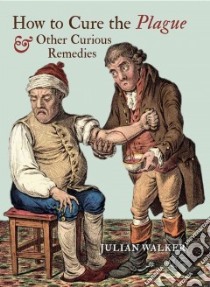How to Cure the Plague & Other Curious Remedies - 9780712357012
Un libro in lingua di Julian Walker edito da British Library Board, 2014
- € 15.20
- Il prezzo è variabile in funzione del cambio della valuta d’origine
Today we are used to reaching for a painkiller when we get a headache, we take anesthetics and antibiotics for granted, and we would not dream of making our own medicines. But until a century ago that was far from the case, and people had to seek their own remedies or depend on far-from-reliable doctors and apothecaries for everything from an ingrown toenail to amputation.
How to Cure the Plague presents a stark reminder of the days when medicine was based on guesswork or superstition, when diagnoses and treatments were bizarre, and, in some situations, even downright disgusting. Compiling excerpts from a range of publications from the Middle Ages to the nineteenth century, including handbills, pamphlets, medical textbooks, and domestic compendia, Julian Walker shows the twists and turns, and the occasional direct routes, that people have taken in the business of trying to understand the processes of disease and the restoration of health. For example, an eighteenth-century treatment for asthma advises: ?Live a fortnight on boiled carrots only.” The Anglo-Saxons had a cure for warts: ?For warts take hound’s urine and mouse’s blood, mixed together, anoint the warts with it, they will soon go away.”; the Tudors had one for bedwetting: ?A mouse rotted and given to children to eat remedieth pissing the bed.”; and the 1607 method for stopping the hiccups was: ?Take thy finger ends, and stop both thine ears very hard, and the hiccup will cease immediately.” It was not all toads and brandy, however, and Walker reveals a number of herb-based treatments that form the basis for many of our pharmaceuticals today.
How to Cure the Plague and Other Remedies is a fascinating, illustrated compilation of some of the most curious and disturbing cures from history and is a must-read for anyone interested in the development of modern medicine.
How to Cure the Plague presents a stark reminder of the days when medicine was based on guesswork or superstition, when diagnoses and treatments were bizarre, and, in some situations, even downright disgusting. Compiling excerpts from a range of publications from the Middle Ages to the nineteenth century, including handbills, pamphlets, medical textbooks, and domestic compendia, Julian Walker shows the twists and turns, and the occasional direct routes, that people have taken in the business of trying to understand the processes of disease and the restoration of health. For example, an eighteenth-century treatment for asthma advises: ?Live a fortnight on boiled carrots only.” The Anglo-Saxons had a cure for warts: ?For warts take hound’s urine and mouse’s blood, mixed together, anoint the warts with it, they will soon go away.”; the Tudors had one for bedwetting: ?A mouse rotted and given to children to eat remedieth pissing the bed.”; and the 1607 method for stopping the hiccups was: ?Take thy finger ends, and stop both thine ears very hard, and the hiccup will cease immediately.” It was not all toads and brandy, however, and Walker reveals a number of herb-based treatments that form the basis for many of our pharmaceuticals today.
How to Cure the Plague and Other Remedies is a fascinating, illustrated compilation of some of the most curious and disturbing cures from history and is a must-read for anyone interested in the development of modern medicine.
Informazioni bibliografiche
- Titolo del Libro in lingua: How to Cure the Plague & Other Curious Remedies
- Sottotitolo: And Other Curious Remedies
- Lingua: English
- Autore: Julian Walker
- Editore: British Library Board
- Collana: British Library Board (Hardcover)
- Data di Pubblicazione: 15 Febbraio '14
- Genere: MEDICAL
- Pagine: 137
- Dimensioni mm: 215 x 152 x 0
- EAN-13: 9780712357012


